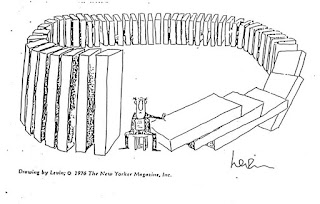Why do we think the way we do?
The unleashed power of the atom has changed everything
save our modes of thinking, and we thus drift toward
unparalleled catastrophes.
Albert Einstein
Albert Einstein
Let me ask you another
question. If you were sick, would you go to a doctor whose medical knowledge
and training is based on the sciences of the 17th century? The
answer is predicable. Yet, it surprises
people when they learn that our prevailing worldview and the way we work and
relate to each other are deeply influenced by the thinking that originated in
the 17th century!
This worldview is often referred to as the “Machine-Age” thinking.
Order, hierarchy, predictability, stability, control, absolute, replaceable parts,
and individuality characterize this thinking, aka, reductionist. The
machine metaphor still persists in our vocabulary and consciousness: “Cogs in
the Wheel”, “Wheels of Government”, and “Machinery of the State”, “Jigsaw
Puzzle”, etc. This way of thinking is deeply embodied in our culture, politics,
institutions and organizations - where we act as if the whole is the sum
of its parts.
Oddly,
the roots of this thinking can be traced in the sciences of then, and in
particular the Newtonian atomistic physics.
Newton viewed the world as a machine that was created to serve its master – God[1]. Later, Newton’s scientific principles were extended to society where people were thought of behaving like isolated atoms, “each moving about chaotically and clashing with one another like billiard balls…. Political thinkers of the time compared these colliding atoms and their interacting forces to the behavior and interactions of individuals in society as they confront each other in pursuit of their self-interest.”[2] Hence, individualism and conflict became the foundations of a new paradigm that has lasted nearly three hundred years.
Newton viewed the world as a machine that was created to serve its master – God[1]. Later, Newton’s scientific principles were extended to society where people were thought of behaving like isolated atoms, “each moving about chaotically and clashing with one another like billiard balls…. Political thinkers of the time compared these colliding atoms and their interacting forces to the behavior and interactions of individuals in society as they confront each other in pursuit of their self-interest.”[2] Hence, individualism and conflict became the foundations of a new paradigm that has lasted nearly three hundred years.
I leave you with another question: What do we miss when we act as if the whole is nothing more than the sum of its parts?
[1] R. Ackoff, Systems Thinking and Thinking Systems, Interact, June
1993
[2] D. Zohar & I. Marshal, The
Quantum Society, Morrow Press, 1994, p. 24




Comments
Post a Comment